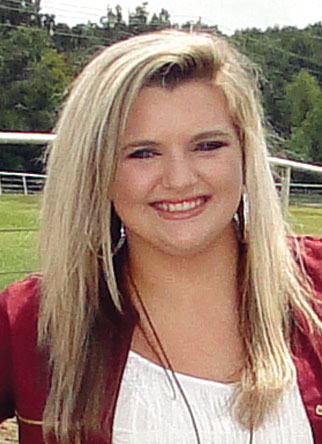
Tori Welsh is definitely not your typical 19-year-old community college student. Although she will be graduating from Carl Albert State College in 2017 as a first step toward her ultimate goal of being a family court judge, she is actively involved in carving out her first career in horse training, trading and selling while working her way towards a judgeship.
“I love horses and I love the idea of being an advocate for children,” she said. “The pathway to becoming a judge is long and I need income along the way, though I will never give up my horses.” Tori’s goal is to keep both careers and balance her life through maintaining both passions.
Tori was only two days out of the hospital when her grandmother, Vickie Wyman, took her riding on a race horse escort pony, called a pony horse, which was a red roan named Sleepy.
When horse women were barely acknowledged, Vickie was training racehorses at Blue Ribbons Down in Sallisaw, Okla., in addition to raising and racing her own horses. Vicki’s mom followed in her mother’s footsteps by breeding and raising Quarter horses as well.
Grandma Vickie also took Tori to pick out her first pony at a pony ranch with about 30 head tied up for perspective buyers to view.
“Sergeant was petite compared to the typical stockier Shetlands surrounding him, but he was perfect for me and had no ‘little man syndrome,’” Tori recalled fondly. “He even let me cut his hair.”
Grandfather Charles Pratt bought Tori her first horse when she was 6, a brown and white 6-year-old gelding named Apache because he had “a patch here and a patch there.”
When she was placed on Apache for the first time, he took the bit in his mouth and ran off with Tori hanging on and enjoying every minute of it while Charles was not happy, to say the least. Tori still has the horse, which will be 20 next year, and recently took him to a birthday party for kids to ride.
Tori believes in diversity of income so she trains and sells both barrel racers and miniature horses. The miniature horses are a more recent addition after seeing an acquaintance train them for pulling a wagon and driving.
“I saw those and figured I could do it too,” Tori said.
She recently sold a miniature for $1,500.
“A good market exists for ponies and miniature horses of all kinds, including pony-size draft horses,” she said.
Barrel racing, on the other hand, has been a passion for Tori since she was very young.
She started with her mother in lead line events when she was 3 or 4, but was riding on her own by the time she was 5. At 8, she won the sweetheart competition at the Garrison Creek Rodeo, which included dressage, speech and ticket sales. That day she also won four trophies, a plaque, a 14-carat gold ring, three or four buckles, a saddle, two sashes, a diamond tiara and a two-horse trailer.
Tori typically keeps three or four horses in training, as well as four or more miniatures on hand so she always has stock to sell. When selecting Quarter horses, she usually, but not always, selects registered stock so that she also has horses for sale even for those who cannot afford registered animals. Color is unimportant. She looks for horses with clearly defined shoulders that indicate good potential for pushing off when turning, clearly defined hips for efficient pivoting and large nostrils for exceptional breathing capacity, which helps to ensure she does not get a “bleeder,” a fairly common performance horse issue. She selects horses between 2 and 8 years old. Before 2, they are not yet developed enough for barrel training, and after 8 they are not as easily trained and therefore provide less income potential.
Tori’s training regimen is far from fast paced.
“I believe horses learn best through slow motion and repetition,” she said.
This translates into the horses not practicing at full speed. She follows a progression that she uses when beginning training at a slower pace and after a race at a more condensed pace.
She begins by walking them through the path and progresses to trotting between the barrels and walking around them. This is followed by trotting the entire pattern. Next she lopes between barrels and trots around them and follows with loping the entire pattern. After a horse has been trained for the first time she will run them once or twice to evaluate their potential and performance, but never after that. They only run in the ring, and she has been very successful. She recently sold a trained barrel racer for $3,500.
Tori is not only an experienced horsewoman, she’s also a smart businesswoman. Half of her income goes to paying for her truck and the other half towards her horse business, which includes buying more horses and maintaining them. In addition to raising Corgis, she also works for the Heart and Soul Horse Company, also in Sallisaw, Okla.
“The biggest challenge in our local horse industry,” explained Tori, “is the lack of stock to choose from. The solution is more people being involved in competing as well as raising and training.”







